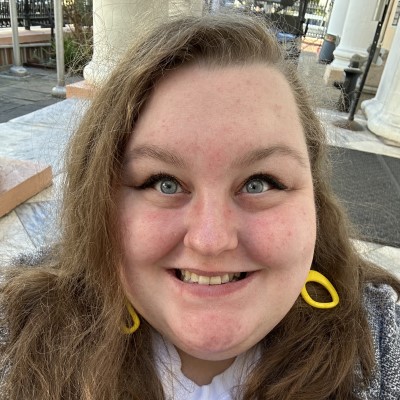Meet Our Faculty: Dr. Cheryl Frazier
Meet Dr. Cheryl Frazier
Assistant Professor of Philosophy, School of Liberal Arts
Faculty member since 2024
cafrazier1@csmd.edu
Pronouns: she/her/hers
Courses Taught
-
PHL-1010 Introduction to Philosophy
- PHL-1410 Contemporary Ethics
About
I grew up in La Plata, but have lived all over the country (including Miami, Oklahoma City, and Alabama). I also love to take road trips with my husband Jeremy, and we try to visit roadside oddities wherever we go. My favorite roadside attraction is the World's Fastest Pop Machine in Lerna, Illinois!
I love all forms of art, but especially music, television, and conceptual art. I bring this into my research, which focuses on more responsible production of and engagement with popular media.
I also love cats and have an extensive collection of art made of (and by!) cats.
Educational Background
- Doctor of Philosophy, University of Oklahoma
- Bachelor of Arts in Philosophy, Barry University
Q&A
I took an interest in philosophy because it helped me think more carefully about the world and my place in it. The critical reasoning skills, curiosity, and open-mindedness I gained from my philosophy classes helped me feel more eager to talk to and work with others and revived my excitement for life.
My ultimate goal in teaching is to help students see philosophy as a tool to bring similar meaning to their lives. Through collaborative discussion and examining real-world applications of the theories we study, I hope to empower my students to make meaningful changes in their communities and to use philosophy as a tool to think about their lives and choices more deeply.
We often get settled in and comfortable with our routines and cultures, but this can lead to us living a more passive life. (Just think about how many hours you spend mindlessly watching TV or scrolling through TikTok each day!)
My hope is that my students can come to see philosophy as one tool (among many!) that can help uncover things they might otherwise overlook. Whether this is implicit premises in an argument, systems of oppression, or something in between, philosophy is needed to help us put a name to and better understand our experiences and the world around us.
By teaching students to critically reflect on their values, choices, and the communities with which they engage, my students are more readily able to explore and identify what is hidden. This allows them to unlock new forms of meaning, understanding, and identity that better equip them to address and improve their lives and communities.
My teaching style emphasizes empathetic, supportive, and collaborative work. I emphasize to my students that we all bring unique experiences, knowledge, and interests to the conversation and that we are all better off when we work together and share these backgrounds. We cannot do philosophy well without doing it together.
My hope is that my students leave all of my courses with a better understanding of themselves and their beliefs; with increased confidence to articulate those beliefs to others; and being better equipped to talk about and put their values into practice within diverse communities.
I have published and presented on many topics in aesthetics, feminist philosophy, applied ethics, and fat studies. Most recently, I have published papers on mindful representation of marginalized groups in popular television in film; using beauty and fashion to resist anti-fat oppression; and on the importance of making humanizing and imperfect characters in television to improve visibility of marginalized communities.
- "Left Behind: Anti-Fatness, Photography, and Aesthetic Agency,” American Philosophical Association Central Division Meeting, February 2024
- “Fat Vanity Projects as a Model for Reimagining Beauty,” Social Justice and Oppression Workshop, University of Alabama, March 2024
- “When ‘Health’ Hurts: Challenging Anti-Fat Bias in Clinical Encounters,” American Society of Bioethics and Humanities Annual Conference, October 2021
- “Hashtags and Harm: The Moral Implications of Appropriation of the ‘Body Positivity’ Movement,” American Philosophical Association Central Division meeting, February 2020
Last updated: 9-9-24
 my.CSMD
my.CSMD